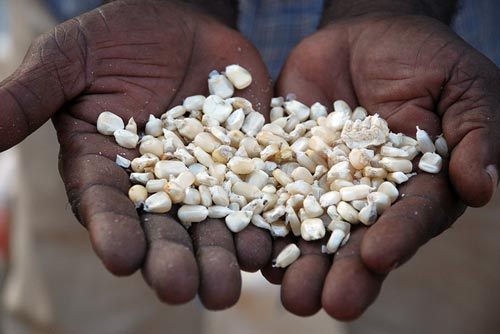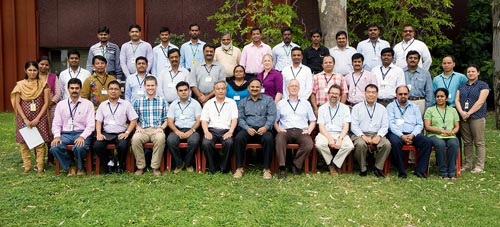 “This project is a rare example of a public-private partnership capable of delivering products to farmers,” said Mike Robinson of the Syngenta Foundation for Sustainable Agriculture (SFSA) at the Affordable, Accessible, Asian (AAA) Drought Tolerant Maize Annual Meeting organized by CIMMYT-Asia at the International Crops Research Institute for the Semi-Arid Tropics (ICRISAT) campus during 20-21 May 2013.
“This project is a rare example of a public-private partnership capable of delivering products to farmers,” said Mike Robinson of the Syngenta Foundation for Sustainable Agriculture (SFSA) at the Affordable, Accessible, Asian (AAA) Drought Tolerant Maize Annual Meeting organized by CIMMYT-Asia at the International Crops Research Institute for the Semi-Arid Tropics (ICRISAT) campus during 20-21 May 2013.
Twenty-seven participants from CIMMYT, Syngenta, and national partners from Indonesia and Vietnam were welcomed by B.M. Prasanna, CIMMYT Global Maize Program director, who elaborated CIMMYT-Asia senior maize breeder B.S. Vivek presented a graphical overview of the project covering its objectives and discussing the progress achieved in 2012. Syngenta’s Naveen Sharma, Srinivasu Bolisetty, and Pathayya Ravindra then reported on the progress made in product development and product testing under managed and targeted stress environments. Future breeding plans were also discussed. Ian Barker, SFSA, discussed plans for delivering AAA products to farmers, Prasanna explained issues related to germplasm export and remedial strategies, and Manuel Logrono of Syngenta elaborated on the plans for testing and seed production. At the end of the first day, Vivek provided an overview of the association mapping project, and CIMMYT-Asia senior maize physiologist P.H. Zaidi gave a talk on the progress in root phenotyping.
The second day began with a visit to the rhizotronics facility at ICRISAT, followed by detailed presentations on genotyping and genome-wide association study (GWAS) analysis by CIMMYT Asia maize molecular breeder Raman Babu, and the progress on Syngenta’s side by Aparna Padalkar. Vivek then took over the stage again to compare the gains made by markers viza- viz conventional approach when talking about CIMMYT’s progress with Marker Assisted Recurrent Selection (MARS) and Genome Wide Selection (GWS). Hu Hung from the Vietnamese National Maize Research Institute and Muhammad Azrai from the Indonesian Cereals Research Institute then reported on the progress made in Vietnam and Indonesia, respectively.
After comparing CIMMYT’s and Syngenta’s approaches to drought phenotyping and the merits and demerits of biparental versus multiparental approaches to GWS, CIMMYT-Asia maize breeder Kartik Krothapalli concluded the meeting with a summary of the action plans discussed during the meeting.
 Capacity development
Capacity development 
